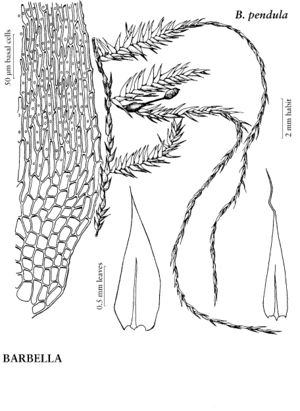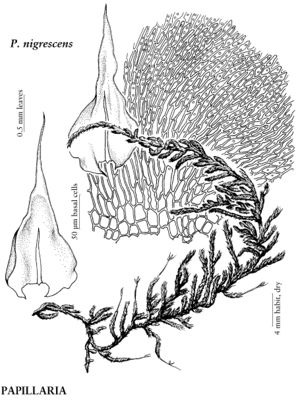Plants medium-sized [to large], occasionally small, usually in pendent tufts, green, yellowish, brownish, or black, dull [or glossy]. Stems creeping, subpinnate to irregularly branched, branches erect, pendent, [or spreading], short to elongate, simple or branched; paraphyllia absent; pseudoparaphyllia foliose. Stem and branch leaves similar, spirally inserted, imbricate, spreading, spreading-complanate, or squarrose; margins usually serrate, sometimes papillose-denticulate, [entire, or serrulate]; apex acute to acuminate or piliferous, usually broadly to narrowly acuminate; costa single or rarely ecostate; alar cells sometimes differentiated; medial laminal cells elongate, usually papillose. Sexual condition dioicous or sometimes autoicous; perigonia and perichaetia axillary, gemmiform. Seta single, dark, short. Capsule usually erect, usually exserted, oblong-ovoid to ovoid, symmetric; stomata proximal on capsule; annulus usually indistinct; operculum rostrate or short-rostrate; peristome double; exostome teeth 16; endostome basal membrane present, segments 16, cilia absent or inconspicuous. Calyptra cucullate or conic-mitrate, naked or hairy. Spores spheric, smooth or rough.
Distribution
Nearly worldwide, primarily tropical and subtropical regions.
Discussion
Genera ca. 30, species ca. 260 (2 genera, 2 species in the flora).
Meteoriaceae is a large and diverse family characteristically found on twigs and bark in warm, humid regions of the world. Many of the taxa grow as tangled festoons of delicate branches dangling from the substrate. The twig habitat, creeping stems with pendent branches, elongate, mostly papillose laminal cells, and pointed leaves, often with 1-seriate filiform apices, are characteristic traits of Meteoriaceae. The taxonomy and phylogenetic relationships of this complex group of mosses are difficult to interpret. See W. R. Buck (1994) for proposals on generic concepts in Meteoriaceae.
Selected References
Lower Taxa
Illustrations
| Family ⠉ | Taxon | Illustrator ⠉ | |
|---|---|---|---|
 | Meteoriaceae | Barbella pendula | Patricia M. Eckel |
 | Meteoriaceae | Papillaria nigrescens | Patricia M. Eckel |
Key
| 1 | Stems and branches densely foliate; medial laminal cells in rows diverging from costa. | Papillaria |
| 1 | Stems and branches loosely foliate; medial laminal cells not in rows diverging from costa. | Barbella |